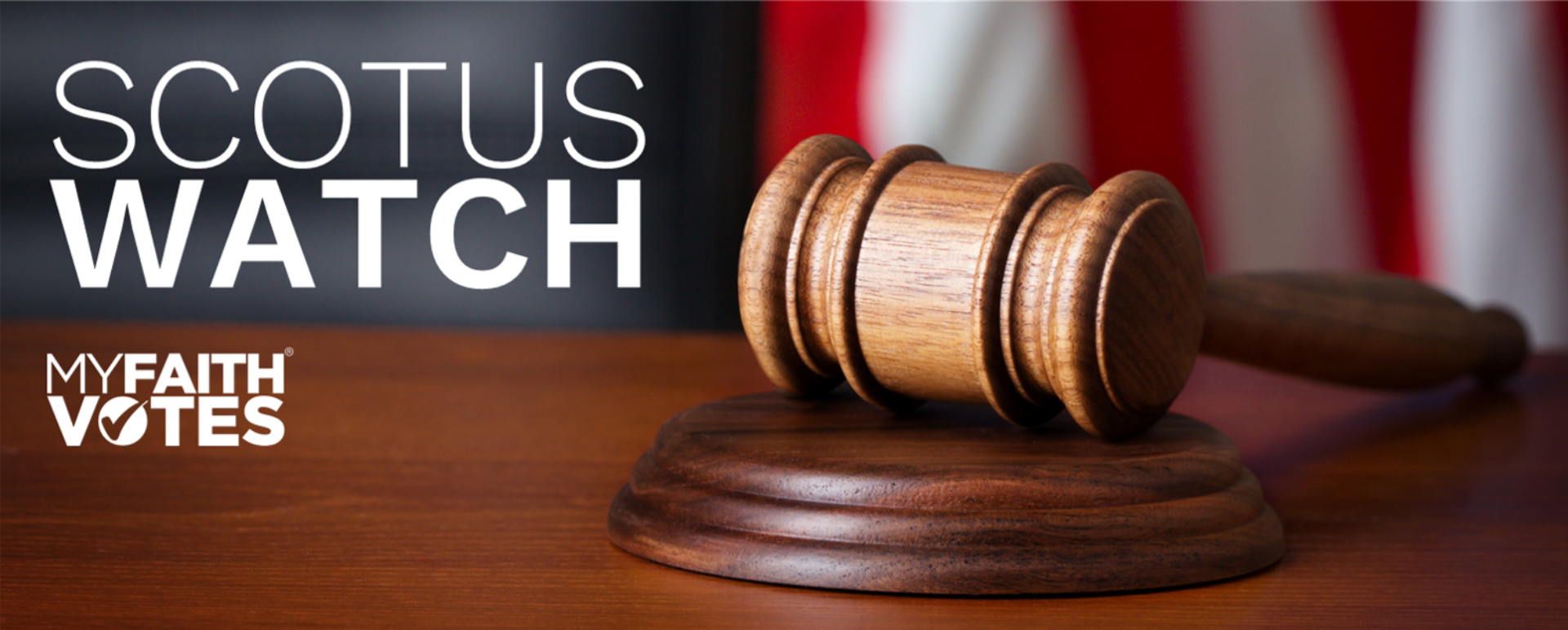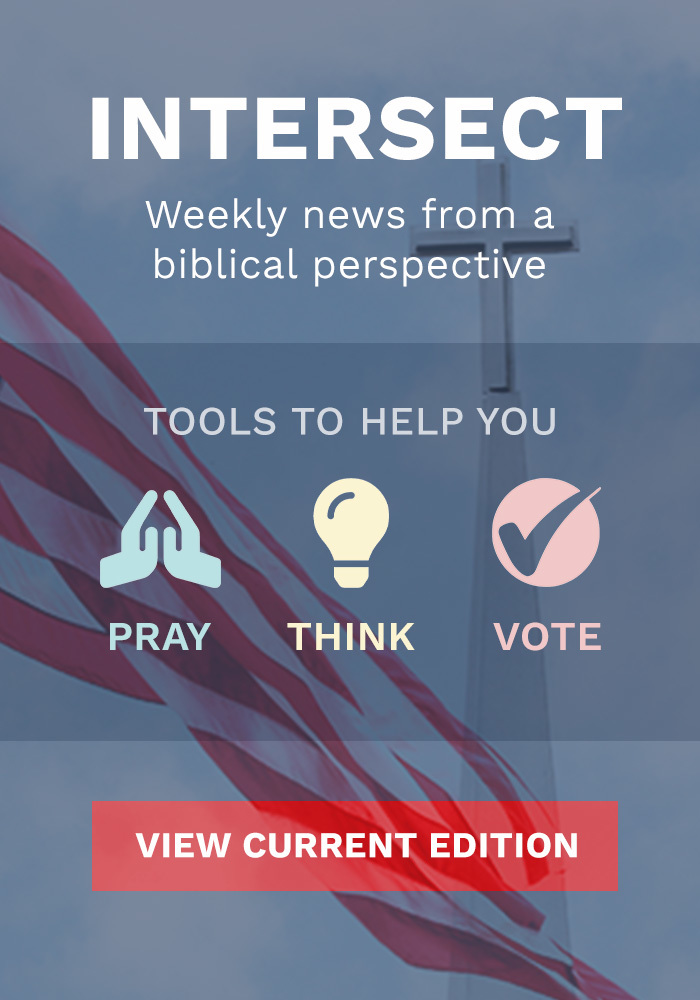
SCOTUS Watch | May 13, 2020
For the first time ever, the Supreme Court heard oral arguments by telephone May 4 - 6, and 11 - 13 for a limited number of previously postponed cases due to COVID-19.
Supreme Court Justice Ruth Bader Ginsburg participated in the oral arguments from her hospital bed where she is being treated for an infection caused by a gallstone. We encourage you to be in prayer for Justice Ginsburg’s recovery and for her heart to be drawn to the Lord.
Here are two recent cases SCOTUS heard worth noting:
- Little Sisters of the Poor v. Commonwealth of Pennsylvania and Trump v. Pennsylvania
- Our Lady of Guadalupe v. Morrissey-Berru and St. James School v. Biel
Little Sisters of the Poor v. Commonwealth of Pennsylvania and Trump v. Pennsylvania
The Little Sisters of the Poor find themselves again defending their right to adhere to their religious conscience. The Affordable Care Act (Obamacare) mandated coverage of women’s health benefits which included abortion-inducing drugs. This placed a tremendous burden on religious organizations, employers, and individuals who believe in protecting unborn life. They were faced with the decision to either violate their religious beliefs, or pay substantial fines for violating the mandate.
Many religious organizations and businesses objected, and in 2014, the Supreme Court ruled in the case Burwell v. Hobby Lobby granting religious businesses relief from the contraceptive mandate. And in 2016, in the case Zubik v. Burwell the Justices sent the Little Sisters of the Poor case, along with many others, back to the lower courts for review in light of their decision.
In 2018 the Trump administration took action to provide much needed protection for religious businesses and organizations by issuing final rules for the Department of Health and Human Services (HHS) to protect those with moral objections to the Affordable Care Act contraceptive mandate.
In response, Pennsylvania and New Jersey have challenged President Trump’s new HHS rules. This brings us to the current Little Sister’s of the Poor case before the Supreme Court heard just last week. The states argue that Congress failed to provide statutory authority for HHS to exempt religious businesses and organizations. They also argue that the new rules were adopted by HHS in a flawed procedural manner.
Since the oral arguments occurred via a teleconference call, the arguments were broadcast across C-Span and other media outlets giving Americans a rare look inside the proceedings of the Supreme Court as justices asked both sides tough questions. You can listen to the entire oral arguments here. It’s interesting to read the justices' responses. Chief Justice Roberts expressed a desire to bring the controversy to an end.
People of faith, across the country, should eagerly await this critical decision as the Court’s ruling will directly impact religious freedom.
Oral arguments for this case were heard on May 6, 2020.
Our Lady of Guadalupe v. Morrissey-Berru and St. James School v. Biel
In the case Our Lady of Guadalupe School v. Morrissey-Berru, a teacher was not offered a contract renewal and filed an age discrimination claim against the school. In a consolidated case, St. James School v. Biel, the St. James School terminated a teacher due to poor teaching performance. However, the teacher claims she was terminated because she took time off for cancer treatments and she also filed a discrimination claim against the school.
In both cases, the federal district court ruled religious institutions are exempt from anti-discrimination employment lawsuits. Upon appeal, the federal Ninth Circuit Court of Appeals reversed the district court’s ruling.
Both schools argue that their teachers provide a critical religious function and therefore decisions to terminate teachers should remain the business solely of the religious institution.
Currently, the law provides a “ministerial exception”. In the 2012 Supreme Court Case, Hosanna-Tabor Lutheran Church and School v. EEOC, the Court ruled federal employment discrimination laws do not apply when churches or religious schools fire a “minister.” However, the term “minister” has yet to be defined.
You can listen to the entire oral arguments here.
The central question in this case: Does the First Amendment's religion clauses prevent civil courts from adjudicating employment-discrimination claims brought by an employee against her religious employer, when the employee carried out important religious functions?
Oral arguments for this case were heard on May 11, 2020.
Here are two important recently released Supreme Court Decisions worth noting:
- Babb v. Wilkie
- Kansas v. Glover
Babb v. Wilkie
The issue: Whether the federal-sector provision of the Age Discrimination in Employment Act of 1967, which provides that personnel actions affecting agency employees aged 40 years or older shall be made free from any "discrimination based on age.”
The outcome: The Supreme Court reversed and remanded the 11th Circuit's decision in an 8-1 ruling, holding “that the statute does not require proof that an employment decision would have turned out differently if age had not been taken into account." Justice Samuel Alito wrote in the opinion, "If age is a factor in an employment decision, the statute has been violated."
In this case, Dr. Noris Babb, a pharmacist working at the VA Medical Center in Bay Pines, Florida, sued the U.S. Department of Veterans Affairs (VA) secretary, alleging age and gender discrimination and a hostile work environment.
Kansas v. Glover
The issue: Under the Fourth Amendment is it reasonable for an officer to suspect that the registered owner of a vehicle is the one driving the vehicle absent any information to the contrary.
The outcome: The court reversed and remanded the Kansas Supreme Court's decision in an 8-1 ruling, holding that when an officer lacks information negating an inference that the vehicle's owner is driving the vehicle, an investigative traffic stop made after running a vehicle's license plate and learning that the registered owner's driver's license has been revoked is reasonable under the Fourth Amendment. Justice Clarence Thomas wrote, “This case presents the question whether a police officer violates the Fourth Amendment by initiating an investigative traffic stop after running a vehicle's license plate and learning that the registered owner has a revoked driver's license. We hold that when the officer lacks information negating an inference that the owner is the driver of the vehicle, the stop is reasonable.”
In this case, a Douglas County police officer stopped Charles Glover on suspicion of driving without a valid license. The officer did not witness any traffic violations. Glover was charged with driving as a habitual violator. Glover moved to suppress evidence from the stop, arguing the officer violated Glover's Fourth Amendment rights. The state district court agreed, dismissing the case. On appeal, the Kansas Court of Appeals reversed the district court's ruling. Glover petitioned the Kansas Supreme Court for review. The state supreme court affirmed the district court's ruling, dismissing the case.
To view the full list of recently released Supreme Court decisions view the Supreme Court website here.
###
My Faith Votes— is a ministry that motivates, equips, and activates Christians in America to vote in every election, transforming our communities and influencing our nation with biblical truth. An estimated 25 million Christians who are registered to vote, fail to vote in presidential elections. My Faith Votes is on a mission to change this statistic by helping Christians act on their faith and vote in every election. When we pray unceasingly for our nation, think biblically about the issues, and vote consistently in every election the impact of Christians taking action from the local to the state and federal level will be unprecedented.
Website | www.myfaithvotes.org Twitter | @MyFaithVotes Facebook | My Faith Votes
